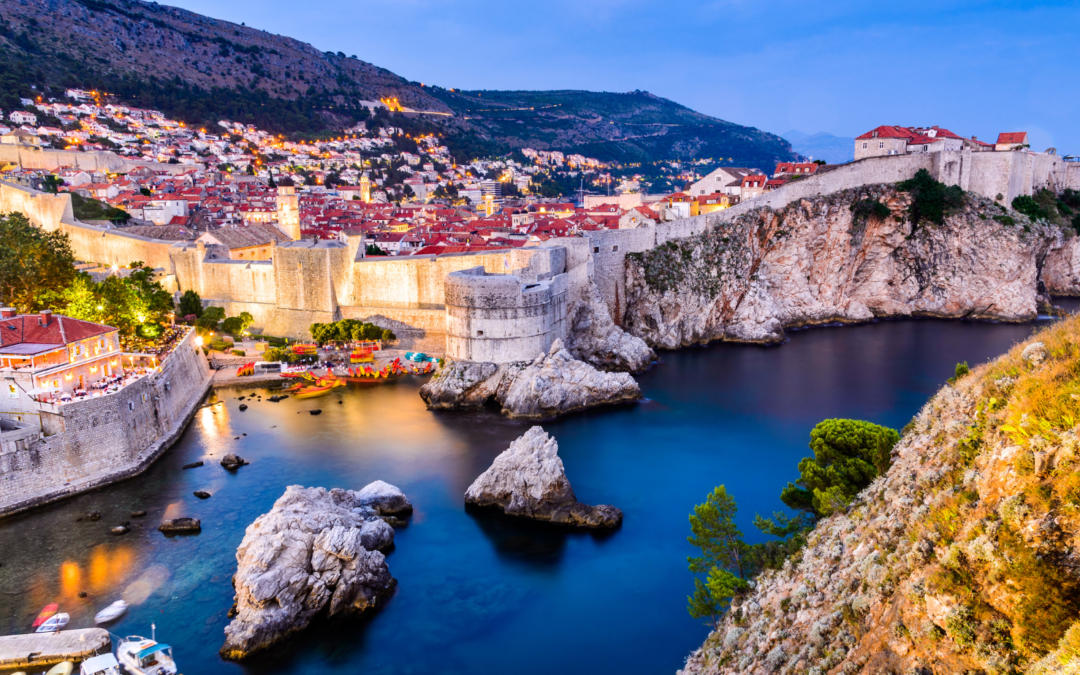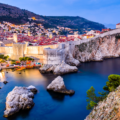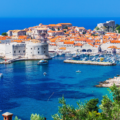Are you dreaming of swapping your office for the Adriatic Sea, but not sure where to start? Croatia’s rising popularity among digital nomads is no accident, offering an idyllic backdrop for remote work.
This guide will illuminate the path to transforming Croatia into your next mobile workstation, detailing visa steps, living costs, and local hotspots. Dive in – your Croatian adventure awaits.
Key Takeaways
- Croatia offers a Digital Nomad Visa that allows non-EU residents to stay and work remotely for up to one year.
- The cost of living in Croatia is affordable, with rent starting from $500 to $700 for a city center apartment and dining out averaging around $40 for two people.
- With fast internet available, digital nomads can choose from vibrant cities like Zagreb or coastal spots like Dubrovnik and Split as their base.
- Traveling to Croatia is convenient via bus, ferry, or plane with good connectivity across major European cities.
- Co-working spaces are popular in Croatian cities providing high-speed internet, flexible memberships, and opportunities for networking.
Understanding Digital Nomad Lifestyle in Croatia

Living as a digital nomad in Croatia means embracing the local “work to live” culture. People take their work seriously but know when to stop and enjoy life. You’ll find vibrant cities like Zagreb, Zadar, Split, and Dubrovnik buzzing with cafes that offer fast wifi and plenty of power outlets.
These spots are great for getting some work done while sipping on strong coffee or enjoying a slice of pizza.
Croatia’s digital nomad community is growing fast since the country introduced its digital nomad visa in 2021. This visa lets non-EU/EEA citizens stay for up to a year if they can show they have enough money or income.
Croatia also ranks highly for safety, which adds peace of mind for people working remotely. Plus, with English widely spoken here, you won’t face many language barriers. Ready to learn about getting your very own Croatian Digital Nomad Visa? Let’s dive into it next!
The Digital Nomad Visa in Croatia

Croatia has opened its doors to the global remote work community with its dedicated Digital Nomad Visa, offering a blend of Mediterranean charm and business-friendly environment. This unique opportunity allows non-EU residents to revel in Croatia’s scenic beauty while maintaining their professional momentum, without getting entangled in typical tourist visa limitations.
Staying up to 90 days
You can soak up the sun on Croatia’s stunning coast or explore its historic cities without a visa for 90 days. This easy entry is perfect for UK, US, Canada, Australia, and New Zealand citizens.
Just pack your bags and grab your travel documents. Make sure you have health insurance—Croatia requires it for all tourists.
Enjoy the beauty of Plitvice Lakes National Park or work from a seaside café in Dubrovnik while staying connected with mobile data. For three months, immerse yourself in the Mediterranean climate and savor local dishes like cevapcici.
Live as a digital nomad here and experience freedom to move freely throughout this captivating country.
Long-term stays
Long-term stays in Croatia are a dream come true for digital nomads seeking a change of pace. The Croatian digital nomad visa makes it possible to soak up the Adriatic coast and work remotely for up to one year.
If you fall in love with life here, consider staying longer by living continuously in Croatia for 4 or 5 years—this could lead to long-term residence.
Family comes first, and Croatia gets that! Your close family members might want to join your adventure. They can apply for temporary residence too through family reunification measures.
Next up, let’s walk you through the easy steps on how to apply for your Croatian ticket to paradise—the Digital Nomad Visa.
How to apply for a Digital Nomad Visa
If you’re considering a longer stay in Croatia, the Digital Nomad Visa is your gateway to an idyllic work-life balance. Here’s how to kickstart your application for this valuable permit:
- Check that you have a valid passport with at least three months left after your planned departure from Croatia.
- Gather proof of sufficient funds or income, showing you can support yourself during your stay. Monthly income should be around $2,500 USD.
- Obtain comprehensive health insurance that will cover the duration of your stay in Croatia.
- Make sure you have a clean criminal record from your home country; a background check is necessary.
- Fill out the online application form for the Croatian Digital Nomad Visa accurately and completely.
- Attach all required documents: a photo, passport copy, proof of funds, health insurance, and criminal record check.
- Submit the application either online or at Croatian diplomatic missions or consular offices abroad.
- Pay the visa fee, which varies between $66 and $188 USD depending on where you apply and current exchange rates.
- Processing time for the visa application typically takes 3 to 5 weeks. Plan accordingly so you’re not left waiting.
- Track your application status regularly to avoid unexpected delays.
- Prepare for any additional requests for information or documentation quickly to keep your application moving forward.
- Make sure to report to the local police within 30 days of arriving in Croatia if applying from within the country.
- Get ready to enjoy remote work with stunning views and rich culture as you embark on your digital nomad adventure in Croatia!
Cost of the Digital Nomad Visa
Getting your digital nomad visa for Croatia will cost you between $66 to $188. This range depends on how you apply and current exchange rates. The process is straightforward, but remember that fees can change, so check the latest information before applying.
Paying for your visa should be easy too. You can use credit cards or bank transfers, which are commonly accepted methods in Croatia. Just make sure you get a receipt to track your expenses!
Taxation for Digital Nomads in Croatia
Digital nomads flock to Croatia for its stunning coast and relaxed lifestyle, but it’s the tax perks that often seal the deal. If you work remotely for non-Croatian companies, good news—you won’t owe income tax in Croatia.
Keep in mind this doesn’t include passive income like rent or dividends. Also, it’s your job to report money made to your home country’s tax office.
Always check if there’s a double taxation agreement between Croatia and your country. This can save you from paying taxes twice on the same income. For help with tax questions, consulting firms are available but remember their fees will have a 25% VAT added due to Croatian law.
Now let’s explore some of the best spots in Croatia where digital nomads can set up their temporary homes – vibrant cities with rich history and reliable Wi-Fi await!
Top Locations for Digital Nomads in Croatia
Croatia’s allure for digital nomads extends far beyond its crystal-clear seas and postcard-worthy coastlines; it’s also home to vibrant cities that fuse the charm of the old-world with contemporary living.
Each city offers a unique backdrop for productivity, from the bustling streets of Zagreb, ripe with co-working spaces, to the historic ambiance of Dubrovnik—your remote work will never lack inspiration.
Zagreb
Zagreb stands out as a prime spot for digital nomads exploring Croatia. With its lively cafes and spacious coworking spaces, the city invites remote workers to set up their laptops and dive into productivity.
You’ll find modern amenities nestled among centuries-old architecture, blending history with high-speed internet.
Applying for your residence permit is hassle-free here — you can do it online or walk into a police station in Zagreb. Enjoy peace of mind knowing that support for digital nomads is part of the city’s vibe.
Picture yourself sipping on strong coffee in a bustling square or strolling through green parks between work sessions. This capital city is not just Croatia’s political heart; it’s fast becoming a hub for global citizens seeking an urban experience with charm.
Zadar
Zadar beckons digital nomads with its pioneering spirit, being the very first city in Croatia to establish a digital nomad village. This coastal gem pairs affordability with a laid-back vibe, perfect for those looking to blend work and leisure seamlessly.
Imagine sipping your morning coffee while overlooking the Adriatic Sea, then strolling to COIN Coworking Zadar or Code Hub to kickstart your productive day.
Life in Zadar isn’t just about work; it’s also an adventure waiting to be experienced. You’re never far from breathtaking nature escapes like Plitvice Lakes National Park, ensuring your weekends can be as exhilarating as your weekdays are focused.
With its robust internet connectivity and relaxed atmosphere, it’s no wonder Zadar ranks among Croatia’s top spots for remote workers seeking that idyllic balance between job and joy.
Split
Split shines as a favorite spot for digital nomads. This bustling city combines ancient history with modern living, offering reliable internet and plenty of cozy cafes to work from.
Picture yourself typing away in the shadow of Diocletian’s Palace, then taking a break to stroll along the Riva waterfront. Varoš, a quieter area, provides cheaper accommodations for those looking to stay longer.
You can explore Krka National Park on weekends or hop on a ferry to visit Hvar. The cost of living won’t break your bank either—especially if you’re coming from the western part of the world.
With its mix of culture, nature, and affordability, Split has everything remote workers need for an ideal work-play balance.
Dubrovnik
Dubrovnik offers a stunning backdrop for digital nomads with its famous Old Town and mesmerizing Adriatic Sea views. Known for being on the set of Game of Thrones, this city draws visitors from around the globe.
Despite being tourist-centric, remote workers find solace here thanks to a tax perk – they don’t pay income tax to Croatia.
Work-friendly cafes dot the marble streets, yet coworking spots are harder to find. Still, digital nomads craft their own inspiring workspaces amid ancient walls and crystal blue waters.
A quick stroll can lead you from your laptop right into history-steeped sights or beachside relaxation—perfect for a midday break or an Instagram story that captures your enviable office-of-the-day!
Optimal Times to Visit Croatia: A Month-by-Month Guide
Planning your trip to Croatia means considering the weather and events. Let’s guide you through the best times to visit, month by month.
- January: It’s cold and quiet. Enjoy city life with fewer tourists in places like Zagreb.
- February: Still chilly but Carnival brings life with colorful parades, especially in Rijeka.
- March: Spring starts to bloom. Perfect for outdoor activities without summer crowds.
- April: Warm days emerge. Ideal for exploring coastal cities before peak tourist season.
- May: Comfortably warm. Sailing and festivals begin, just as the islands start buzzing.
- June: The official start of summer. Expect more people but great beach weather.
- July: High season arrives. Coastal spots like Split and Dubrovnik are very hot and busy.
- August: Still peak season. Enjoy late-night festivals and a vibrant social scene.
- September: Summer crowds leave but the sea stays warm. Harvest festivals pop up inland.
- October: A chill returns; however, it’s a good time for quieter travels and lower prices.
- November: Much cooler, with rainy days. Cozy up in cafes or enjoy indoor museums.
- December: Christmas markets light up cities with festivities—think mulled wine and crafts.
Cost of Living for Digital Nomads in Croatia
Dipping your toes into the Adriatic’s digital nomad lifestyle means you’ll need a solid grasp of Croatia’s living expenses. From Zagreb’s urban buzz to Dubrovnik’s seaside serenity, the cost factor is pivotal for remote workers seeking a blend of work and wanderlust in this Mediterranean gem.
Accommodation Costs
Finding a place to stay in Croatia won’t break the bank. Rent for a one-bedroom apartment in city centers like Zagreb or Split averages around $500 to $700 per month. If you prefer living by the beach, expect higher prices, especially during peak tourist season.
More affordable options include sharing an apartment or choosing a less central location. Many digital nomads opt for short-term holiday apartments which offer flexibility and come fully furnished.
Prices drop significantly once you step away from the tourist hotspots. Smaller towns or suburban areas can cut your rent down even more. With these savings on accommodation, you’ll have extra cash for dining out at local pizzerias or trying cevapi and burek from street vendors—delicious! Next up: let’s talk about what it costs to eat out while enjoying the digital nomad life in Croatia.
Dining Out Expenses
After sorting out where to stay, you’ll want to explore local dining options. Eating out in Croatia won’t break the bank. Enjoy a hearty lunch or grab a quick bite for around $8. When evening rolls around, treat yourself and a friend to dinner at a cozy restaurant for about $40 on average.
You can sip on a rich Cappuccino as you work, costing just $1.87—a small expense for your office with a view.
Croatia offers delicious meals that blend Mediterranean flavors with their own unique twist. Try traditional dishes like soparnik or savor some fresh seafood by the Adriatic Sea. With payment methods ranging from cash in Croatian kuna to credit cards, paying is easy.
Just keep an eye out for ATM fees if you need cash—the rest is simple enjoyment of Croatia’s generous hospitality and tasty cuisine!
Internet and Mobile Data Costs
Croatia keeps you connected without breaking the bank. Whether you’re sipping coffee in Zagreb or sunbathing in Dubrovnik, good wifi is easy to find. Public places often have free wifi spots.
You can choose from T-Mobile Croatia, A1 Croatia, and TELE2 for mobile data plans. These operators offer a range of options that cater to your needs—whether you need just enough data to check emails or a hefty package for heavy streaming.
Costs are reasonable and competitive compared to other European countries. Prepaid deals start at low prices for basic packages, with more extensive offers still affordable for those who need extra gigabytes on the go.
Always look out for special promotions and discounts; they pop up frequently and can save you even more money as you explore Croatia’s stunning landscapes while staying on top of work.
The Appeal of Croatia for Remote Work
Many digital nomads choose Croatia for its stunning coastal cities and relaxed lifestyle. You can set up your laptop by the Adriatic Sea, enjoy local cuisine like “borek” during work breaks, or stroll through ancient streets after logging off.
Towns brim with history, from Diocletian’s Palace in Split to the walled beauty of Dubrovnik.
The country’s cost-effective living means you have more money to explore or save. Internet speeds are fast and reliable, making online work a breeze. Cozy cafés offer perfect spots for working while sipping on strong coffee; come evening, swap stories with other nomads over a glass of local wine.
With a digital nomad visa specifically tailored for non-EU folks, settling down here short-term is simple and hassle-free.
Getting to Croatia
Navigating your journey to this Adriatic gem is a breeze — Croatia’s well-connected transport network caters to every preference, from the scenic thrills of a coastal ferry ride to the swift convenience of hopping on a plane.
Whether you’re boarding a bus with panoramic views or joining fellow adventurers in group travel, your Croatian odyssey begins with an arrival as stunning as the destination itself.
Bus
Bus travel to Croatia offers a wallet-friendly option for digital nomads. From places like Bosnia or Montenegro, you can hop on a bus and find yourself in Split or Dubrovnik within half a day.
Enjoy the journey with stunning views along the way – it’s both time-efficient and scenic.
Group trips add another level of excitement. Travel services such as Busabout connect you with fellow remote workers, creating instant networks while moving from one Croatian hotspot to another.
Imagine heading to your next work location on The Yacht Week, where meetings and spreadsheets blend with sunsets and socials on the Adriatic Sea!
Ferry
Traveling to Croatia by ferry adds a touch of adventure to your digital nomad journey. Imagine leaving from Venice, Pesaro, Pescara, or Bari and gliding across the azure Adriatic Sea.
You’re not just getting from point A to B; you’re sightseeing as you go. The ferry ride gives you stunning views and the chance to visit beautiful islands like Hvar, Korcula, or Brac.
Ferries are perfect for remote workers looking for a relaxed pace and inspiration from the sea’s tranquility. Plus, these vessels cater to your connectivity needs with onboard Wi-Fi in many cases.
Forget about long airport waits – hop on a ferry and make your workspace scenic!
Plane
Flying into Croatia is often the quickest way to start your adventure. Major airlines connect to cities like Zagreb, Split, and Dubrovnik from many Schengen countries. As a digital nomad, you’ll appreciate that these airports offer Wi-Fi so you can catch up on work or let folks back home know you’ve arrived.
Choose your airport based on where you want to explore first. Keep an eye out for visa waiver programs if you come from the U.S., it might make entry smoother. Packing light saves time at baggage claim and gets you out exploring Croatia’s ancient cities faster!
Group Travel
Group travel to Croatia offers plenty of benefits for digital nomads and remote workers. Since Croatia is a favorite destination for like-minded travelers, you’ll find it easy to join forces with others exploring the country’s stunning landscapes and vibrant cities.
With its “work to live” culture, groups can enjoy a laid-back vibe while networking or collaborating on projects. Affordable living costs make Croatia attractive for friends looking to share accommodation and experiences without breaking the bank.
Each member should bring a valid passport – a key requirement that smooths group planning processes significantly. Beyond sightseeing, your squad could collectively apply for Croatian digital nomad visas and potentially turn an adventurous trip into an extended work-cation embracing azure coastlines and historic towns as new backdrops for your daily grind.
Next up: Co-working spaces are hubs where creativity flows among global citizens..
Co-working Spaces in Major Cities
Croatia’s major cities offer ideal spots for digital nomads to work. Co-working spaces in Zagreb and Split buzz with creativity and connection. You’ll find high-speed internet, comfy desks, and plenty of coffee in these shared offices.
They’re perfect for getting your work done while meeting other professionals. Memberships are flexible—you can drop in for a day or settle in for months.
Network over lunch or learn at evening workshops—the choice is yours! These co-working hubs bring together dynamic crowds from many countries. They blend the charm of Croatian culture with the needs of modern work life.
After a productive day, you might step out to explore beautiful city streets or waterfront cafes.
Ready to unwind? Croatia offers lovely excursions that mix history, nature, and local flavors—your next adventure waits just outside your temporary office door!
Excursions for Digital Nomads in Croatia
While embracing the digital nomad life in Croatia, adventure beckons beyond your laptop screen—think enticing excursions that promise a blend of cultural enrichment and natural beauty.
From island-hopping along the Dalmatian Coast to uncovering the mysteries of ancient fortresses, these experiences are far from your average coffee break and could just be the highlight of your Croatian remote work chapter.
Visiting Hvarr
Hvar is a gem for digital nomads who love to mix work with pleasure. The island’s narrow streets beckon you to explore, while stunning views make for perfect relaxation spots after a day of remote work.
Sure, Hvar has a reputation for lively parties, but there’s so much more to experience. You’ll find an assortment of tourist shops offering local crafts and souvenirs that capture the essence of Croatian culture.
Despite Hvar being less known as a working destination, it doesn’t lack charm or worth for the traveling remote worker. You might have to search a bit harder for cozy corners with strong Wi-Fi signals, but cafes and bars by the seafront provide serene spots to send off those important emails.
After closing your laptop, wander along the marina or venture into quaint boutiques – they’re just around the corner from most working spaces.
Ready for something different? Consider chartering a boat and setting sail from Hvar’s idyllic ports – your next adventure awaits on the shimmering Adriatic Sea.
Chartering a Boat
Imagine sailing along Croatia’s beautiful coast at your own pace. Chartering a boat here gives you this freedom. You can stop for a swim in clear waters or dock at charming coastal towns whenever you want.
It’s perfect for digital nomads looking for an escape from their screens. Websites to book your sea adventure are just a click away, offering many options that fit what you need.
You set the course and make the schedule on your chartered boat trip. Pick out secluded spots for some quiet time or join bustling harbors full of life. The experience is yours to tailor, making it a unique way to see Croatia’s stunning kornati islands and hidden coves.
After anchoring back on land, get ready to explore more treasures ashore with a day trip next on your journey.
Taking a Day Trip
Explore Croatia’s beauty with a day trip from Split. You’ll find stunning islands, serene national parks like Krka and Plitvice Lakes, and exciting new cultures in nearby countries like Montenegro and Bosnia and Herzegovina.
These trips are perfect for when you need a break from your screen.
Get on a short ferry ride to an island for some sun and sea. Or hop on a bus to the lush waterfalls of Krka National Park. Every trip offers something unique—whether it’s the historic streets of Dubrovnik or the mountain views in Bosnia.
Use these escapes to recharge your creativity as a digital nomad in Croatia.
Applying for the Digital Nomad Residence Permit in Croatia
Securing your status as a digital nomad in Croatia hinges on a smooth application process for the Digital Nomad Residence Permit. It’s a straightforward path to legality, immersing you fully into Croatia’s embrace, with clearly defined requirements that pave the way for a life balanced between work and Adriatic leisure.
Requirements and Procedures
Getting your digital nomad residence permit for Croatia means gathering some key documents. First, you’ll need to fill out an application form and show a valid passport. You must also prove you have enough money – at least 2,539.31 euros per month.
This shows you can support yourself while living there. Plus, don’t forget health insurance that lasts for your whole stay and a clean criminal record from your home country.
You will apply for the visa either before arriving or once you’re in Croatia. Make sure to register your address with the police; even if it’s just a hotel at first, it counts! The process usually takes 3 to 5 weeks, so plan ahead.
While waiting for approval, consider signing up for Croatian state health insurance as an extra safety net.
Administrative Fees
You’ll need to pay administrative fees for your digital nomad permit. These fees are necessary for processing your application. You can settle this payment at a Croatian embassy or consulate before you arrive.
Alternatively, make the payment in person at a local police station once you’re in Croatia.
Keep in mind, having passport photos ready is part of the process. In Croatia, they cost around 14 euros for a set. Having these photos on hand will help speed up your permit application.
Don’t forget this step – it’s essential to obtaining your temporary residence as a digital nomad!
Taxation for Digital Nomads
Living the digital nomad life in Croatia comes with a big plus – you don’t pay income tax here if your clients are not Croatian. It’s this simple rule that makes Croatia even more attractive to remote workers from around the globe.
Your earned money from online work or services stays tax-free, as long as it doesn’t come from Croatian companies.
Remember, though, personal income like investments might still be taxed. And always check with your home country about taxes; they may want a cut too. Some countries have deals with Croatia to avoid double taxation – so it’s worth investigating! Next up, let’s explore the best spots in Croatia for digital nomads to settle down and get those creative juices flowing.
Conclusion
Croatia opens its arms to digital nomads with sunny skies and a welcoming visa. Wander ancient streets, work by the Adriatic Sea, and live affordably. Fast internet meets rich history here.
Have your cake—by the slice or the whole adventure. Croatia is calling; will you answer?.
FAQs
1. What is the Croatia digital nomad visa?
The Croatia digital nomad visa lets non-EU residents live and legally work remotely in Croatia for up to a year. This special temporary residence permit means you can enjoy Croatia’s stunning cities like Dubrovnik without needing to slot into the usual Schengen area rules.
2. Can U.S. citizens apply for this type of visa easily?
Yes, U.S. citizens can apply for a Croatian digital nomad visa—just ensure you have all required documents, like your passport and maybe a marriage certificate or birth certificates if you’re bringing family.
3. Is it tricky to get my hands on a Croatian work permit?
Not really—it’s pretty straightforward! If you’re planning some self-employment under the Adriatic sun, just collect your paperwork, smile for an identification document photo, pay the visa fees, and dive into that tomato sauce with fresh pogaca while you wait.
4. Do I need a big salary to survive as a digital nomad in Croatia?
Well, not necessarily—you’ll find living costs vary; however, having enough income is vital since beef sausages don’t buy themselves! You’ll need proof of sufficient funds or pension if retired—that way; you can savor life by the sea in Rovinj without stress.
5. Will my European passport help me skip some steps here?
Absolutely—having an EU passport means enjoying the right of free movement within many EFTA countries like Slovenia and others around Serbia—not forgetting that coveted access across Schengen states!
6. What about healthcare? Should I worry while munching on donuts in Zagreb?
No worries at all—as long as you’ve got health insurance sorted out before nailing down that entry visa—you’re good to go! All set then? Picture yourself tapping away on your laptop with views over sparkling waves—now that’s living!


























